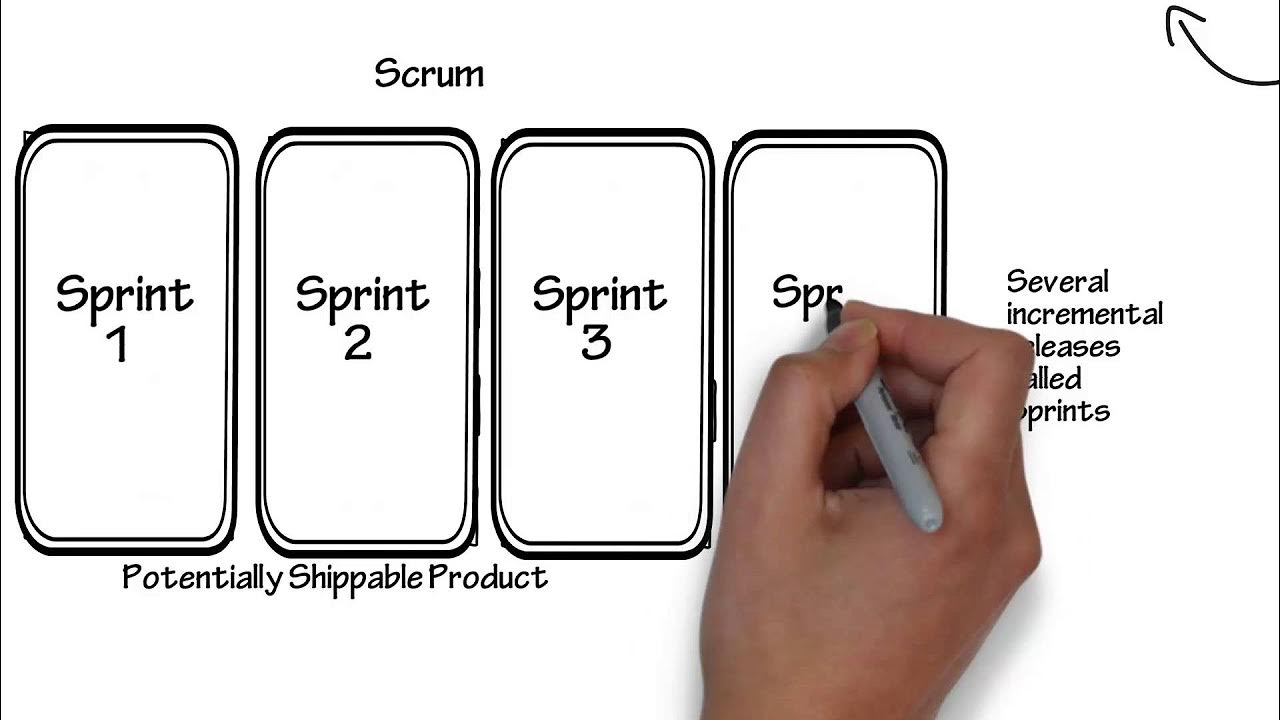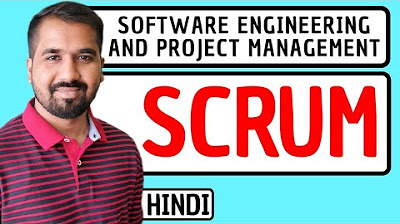Scrum Explained Under 20 Mins | What Is Scrum? | Scrum Master Training Tutorial | Simplilearn
Summary
TLDRThis video from Simply Learn offers a comprehensive introduction to Scrum, a popular Agile framework. It covers key roles like Product Owner, Scrum Master, and Development Team, as well as essential artifacts such as Product Backlog and Sprint Backlog. The video also explains Scrum events, including Sprint Planning, Daily Scrum, Sprint Review, and Sprint Retrospective. Additionally, it highlights the benefits of Scrum, common challenges, and popular tools like Jira, Trello, and Azure DevOps. Viewers are encouraged to explore Scrum training and certification programs to advance their careers.
Takeaways
- 😀 Scrum is an agile framework that facilitates the management and completion of complex projects through adaptability, collaboration, and an iterative approach.
- 📚 Simply Learn offers certified Scrum Master certification training to elevate one's career with immersive training by globally renowned CSTs.
- 🔑 The Product Owner in Scrum is crucial, acting as the voice of the customer, defining and prioritizing the product backlog, and ensuring focus on the most valuable tasks.
- 🛠️ The Scrum Master serves as a facilitator and coach, ensuring the Scrum framework is followed effectively and removing obstacles that hinder the team's progress.
- 💼 The Development Team in Scrum is self-organizing and cross-functional, possessing all the skills necessary to complete the work and deliver high-quality increments.
- 📝 Scrum Artifacts include the Product Backlog, Sprint Backlog, and Increment, which are essential for guiding the development process and reflecting progress.
- 🔄 Scrum Events such as Sprint Planning, Daily Scrum, Sprint Review, and Sprint Retrospective are key to the framework's process flow and continuous improvement.
- 🚀 Benefits of Scrum include increased transparency, improved team collaboration, enhanced adaptability to changes, and faster delivery of valuable products.
- 🔧 Common challenges of Scrum include resistance to change, handling distributed teams, and managing large projects, which can be addressed through education, technology, and scaled frameworks.
- 🛠️ Tools like Jira, Trello, and Azure DevOps support Scrum practices by offering features for backlog management, Sprint planning, and tracking progress.
- 🌟 Simply Learn's catalog of certification programs in domains such as data science, cloud computing, cybersecurity, AI, and machine learning can help individuals stay ahead in their careers.
Q & A
What is Scrum?
-Scrum is an agile framework that has revolutionized the way complex projects are managed and completed. It focuses on adaptability, collaboration, and an iterative approach, making it ideal for dynamic and fast-paced environments. While most commonly associated with software development, Scrum principles can be applied to various industries to enhance efficiency and product quality.
What are the primary roles in Scrum?
-The primary roles in Scrum are the Product Owner, Scrum Master, and Development Team. The Product Owner defines and prioritizes the product backlog, the Scrum Master facilitates the Scrum framework and removes obstacles, and the Development Team consists of professionals who work together to deliver a product increment.
What is the Product Owner responsible for?
-The Product Owner is responsible for defining and prioritizing the product backlog, ensuring that the team focuses on the most valuable tasks. They work closely with stakeholders to gather requirements, set clear goals, and make informed decisions about the product direction. Key responsibilities include defining the product vision and roadmap, creating and managing the product backlog, and accepting or rejecting completed work.
What are the key responsibilities of a Scrum Master?
-The key responsibilities of a Scrum Master include facilitating Scrum events like Sprint planning, daily Scrum, Sprint review, and Sprint retrospective; removing impediments that block the team's progress; coaching the team on Scrum practices and principles; protecting the team from external distractions; and promoting a healthy team dynamic and addressing conflicts.
What is the purpose of the Development Team in Scrum?
-The Development Team in Scrum is responsible for delivering a product increment. They are self-organizing and cross-functional, possessing all the necessary skills to complete the work without relying on external sources. Their key responsibilities include estimating and planning work during Sprint planning, collaborating daily to achieve the Sprint goal, delivering a potentially shippable product increment by the end of the Sprint, continuously improving their processes and practices, and maintaining transparency through regular communications and updates.
What are Scrum artifacts and their purposes?
-Scrum artifacts include the Product Backlog, Sprint Backlog, and Increment. The Product Backlog is a dynamic list of all the work needed for the product, managed and prioritized by the Product Owner. The Sprint Backlog is a subset of the Product Backlog containing items selected for the current Sprint, with a plan for accomplishing this work. The Increment represents the sum of all work at the end of the Sprint, meeting the definition of 'Done' and providing tangible evidence of progress.
What are the main Scrum events and their purposes?
-The main Scrum events include Sprint, Sprint Planning, Daily Scrum, Sprint Review, and Sprint Retrospective. A Sprint is a time-boxed period for creating a product increment. Sprint Planning defines what will be accomplished in the upcoming Sprint. Daily Scrum is a short daily meeting to synchronize activities and identify obstacles. Sprint Review inspects the completed work and gathers feedback. Sprint Retrospective reflects on processes and practices to identify improvements.
What are some benefits of using Scrum?
-Some benefits of using Scrum include increased transparency through regular events and clear artifacts, improved team collaboration by leveraging diverse skills, enhanced ability to adapt to changes through iterative approaches, and faster delivery of valuable product increments, enabling quicker time to market and reducing project delays.
What are common challenges when implementing Scrum?
-Common challenges when implementing Scrum include resistance to change, especially in organizations accustomed to traditional project management methods; handling distributed teams, which can face communication and collaboration challenges; and managing large projects, which may require scaling Scrum using frameworks like Scrum of Scrums, Nexus, or Scaled Agile Framework (SAFe).
What tools are commonly used to support Scrum practices?
-Common tools to support Scrum practices include Jira, which offers robust support for Scrum with features for creating and managing product backlogs and tracking progress; Trello, a flexible tool that uses boards, lists, and cards to organize tasks; and Azure DevOps, a comprehensive suite of development tools that supports Scrum and integrates seamlessly with other Microsoft tools.
Outlines

Cette section est réservée aux utilisateurs payants. Améliorez votre compte pour accéder à cette section.
Améliorer maintenantMindmap

Cette section est réservée aux utilisateurs payants. Améliorez votre compte pour accéder à cette section.
Améliorer maintenantKeywords

Cette section est réservée aux utilisateurs payants. Améliorez votre compte pour accéder à cette section.
Améliorer maintenantHighlights

Cette section est réservée aux utilisateurs payants. Améliorez votre compte pour accéder à cette section.
Améliorer maintenantTranscripts

Cette section est réservée aux utilisateurs payants. Améliorez votre compte pour accéder à cette section.
Améliorer maintenantVoir Plus de Vidéos Connexes

Introduction to Scrum - 7 Minutes

O dia a dia: o que é scrum e como rodar uma sprint?

Scrum vs Agile: Key Differences Simplified! 🚀 | KnowledgeHut

SCRUM vs SAFe : What's the difference? How are they related?

Scrum Explained in Hindi l Software Engineering and Project Management Course

What is Scrum? | Scrum in 20 Minutes | Scrum Master Training | Edureka
5.0 / 5 (0 votes)
